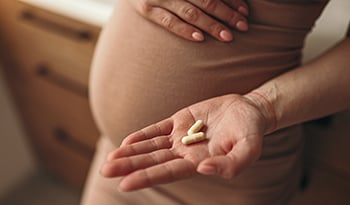Isu Kesihatan Wanita Yang Paling Biasa+Makanan Tambahan Terbaik

Pemakanan yang betul adalah kunci bagi tubuh wanita untuk menyokong kesihatan keseluruhan dan menguruskan perubahan hormon sepanjang hayat. Malah kekurangan nutrisi kecil boleh menyebabkan masalah seperti keletihan, PMS, kemurungan, dan peningkatan risiko keadaan serius seperti penyakit jantung, kanser payudara, dan osteoporosis.
Artikel ini mengkaji masalah kesihatan wanita utama di peringkat kehidupan yang berbeza, menonjolkan peranan makanan tambahan dalam menangani cabaran ini. Topik termasuk kesihatan umum, haid, kehamilan, dan menopaus.
Isu Kesihatan Wanita Umum
Kesihatan jantung dan Strok
Penyakit jantung menyerang lelaki dan wanita sama rata, tetapi di A.S., satu daripada empat kematian wanita disebabkan oleh penyakit jantung atau strok. Menggalakkan kesihatan kardiovaskular adalah matlamat utama bagi wanita.
Salah satu suplemen yang paling penting untuk kesihatan jantung ialah CoQ10, komponen penting mitokondria — unit penghasil tenaga sel kita. Peranannya serupa dengan palam pencucuh dalam enjin kereta; tanpanya, mitokondria tidak dapat menghasilkan tenaga.
Walaupun badan menghasilkan beberapa CoQ10, penyelidikan menunjukkan manfaat yang signifikan daripada suplemen, terutama bagi mereka yang mempunyai fungsi kardiovaskular yang menurun atau mengambil ubat penurun kolesterol, yang menurunkan tahap CoQ10. Keperluan CoQ10 juga boleh meningkat seiring bertambahnya usia, kerana tahap secara semula jadi menurun.
CoQ10 terdapat dalam dua bentuk: ubiquinone dan ubiquinol. Ubiquinone adalah yang paling banyak dikaji untuk kesihatan jantung, tetapi ubiquinol lebih baik diserap. Dos yang disyorkan adalah 50-100 mg sehari untuk ubiquinol dan 100-300 mg sehari untuk ubiquinone. Dos yang lebih tinggi dinasihatkan jika matlamatnya meningkatkan fungsi jantung.
Kesihatan Tulang dan Sendi
Wanita lebih terjejas oleh masalah sendi berbanding lelaki, sebahagiannya disebabkan oleh faktor hormon. Memelihara kesihatan tulang memerlukan pendekatan seimbang yang melibatkan diet, gaya hidup, dan suplemen yang betul.
- Kalsium dan vitamin D3 adalah penting untuk kesihatan tulang, dengan kajian menunjukkan 600—1,000 mg kalsium dan 2,000-4,000 IU vitamin D3 setiap hari untuk kebanyakan wanita.
- Magnesium juga penting untuk kesihatan tulang dan menyokong aktiviti vitamin D. Dos kalsium yang tinggi boleh menjejaskan penyerapan magnesium, jadi disyorkan nisbah kalsium-ke-magnesium 2:1 (300-500 mg magnesium setiap hari).
- Silika, terutamanya dalam bentuk BioSil, menyokong ketumpatan tulang dan kandungan kolagen. Dos harian 6 mg telah terbukti meningkatkan ketumpatan tulang sebanyak 2% dan kolagen sebanyak 22% dalam setahun, tanpa kesan sampingan.
- Vitamin K2 (MK-7) adalah tambahan utama lain, membantu mengaktifkan osteocalcin, yang menambat kalsium dalam tulang. Kajian klinikal menunjukkan bahawa 180 mcg setiap hari dapat meningkatkan tahap vitamin K, meningkatkan osteocalcin aktif, dan mengurangkan kehilangan mineral tulang yang berkaitan dengan usia. Tumpuan bukan hanya pada berapa banyak kalsium yang anda ambil tetapi seberapa berkesan ia disatukan ke dalam tulang. MK-7 membantu memastikan ini.
- Tahap sulfur yang rendah boleh menyumbang kepada kesihatan sendi yang buruk. MSM (metil-sulfonil-metana), bentuk utama sulfur dalam badan, adalah suplemen yang popular untuk kesihatan sendi. Sulfur memainkan peranan penting dalam menstabilkan tisu penghubung tulang rawan, tendon, dan ligamen. Kajian menunjukkan MSM meningkatkan kesihatan sendi, dengan hasil yang lebih baik apabila digabungkan dengan glukosamin sulfat, yang menyokong pembinaan tulang rawan. Dos yang disyorkan ialah 1,200-2,000 mg MSM dan 1,500 mg glukosamin sulfat setiap hari.
Kesihatan Payudara
Walaupun kanser payudara adalah kebimbangan utama untuk kesihatan payudara wanita, satu lagi masalah umum adalah penyakit payudara fibrokistik (FBD), keadaan jinak yang dicirikan oleh kehadiran beberapa sista payudara. Diet memainkan peranan penting dalam mencegah barah payudara dan FBD.
Diet yang kaya dengan makanan keseluruhan dan tidak diproses seperti bijirin, kekacang, sayur-sayuran, buah-buahan, kacang, dan biji adalah disyorkan. Makanan ini membantu menggalakkan pergerakan usus yang kerap, yang penting kerana wanita dengan kurang dari tiga pergerakan usus setiap minggu adalah 4.5 kali lebih cenderung untuk mengembangkan FBD daripada mereka yang mempunyai sekurang-kurangnya satu sehari.
Faktor pemakanan utama adalah mengekalkan nisbah asid lemak omega-3 hingga omega-6 yang lebih tinggi. Ini boleh dicapai dengan memakan ikan yang tinggi dalam omega-3s, seperti salmon, ikan tenggiri, ikan bilis, dan herring, atau mengambil minyak ikan (1,000-2,000 mg EPA+DHA). Ia juga penting untuk mengurangkan pengambilan omega-6 daripada sumber seperti daging, tenusu, dan minyak biji (jagung, safflower, soya). Satu kajian mendapati bahawa wanita dengan nisbah omega-3: omega-6 tertinggi mempunyai risiko penurunan 67% untuk penyakit payudara kronik.
Tanah biji rami mengandungi lignan, jenis serat khas yang boleh mengikat reseptor estrogen dan mengurangkan kesan mempromosikan kanser estrogen pada tisu payudara. Lignans juga membantu menghilangkan estrogen yang berlebihan dari badan. Saya cadangkan menambah 1-2 sudu setiap hari ke bijirin panas, salad, atau smoothie. Bagi wanita yang berisiko mendapat kanser payudara atau dengan penyakit payudara fibrokistik, makanan tambahan ini boleh membantu:
- Indole-3-carbinol (I3C), di-indoylmethyl (DIM), dan sulfurophane - fitonutrien daripada sayur-sayuran keluarga kubis yang menyahtoksin estrogen.
- Kalsium D-glukarat - menyekat penyerapan semula estrogen yang dikeluarkan.
- Ekstrak teh hijau - mengandungi polifenol yang mengatasi kesan negatif estrogen.
Kemurungan, Kebimbangan, dan Kesihatan Mental
Wanita sekurang-kurangnya dua kali lebih cenderung daripada lelaki mengalami kemurungan dan kegelisahan. Turun naik hormon sering dipersalahkan kerana gejala cenderung memuncak semasa PMS (kemurungan, kerengsaan, perubahan mood, pengekalan air, kelembutan payudara), kehamilan, selepas bersalin, perimenopause, dan menopaus.
Walaupun hormon memainkan peranan, kekurangan nutrisi juga meningkatkan risiko kemurungan dan kegelisahan. Vitamin (terutamanya vitamin B), mineral (seperti zink dan magnesium), dan asid lemak omega-3 (minyak ikan) adalah penting untuk keseimbangan hormon. Bersama dengan nutrien asas ini, berikut adalah cadangan tambahan berdasarkan peringkat kitaran hidup wanita yang berbeza:
- Wanita haid: 5-Hydroxytryptophan (5-HTP) adalah bentuk triptofan yang membantu menghasilkan serotonin, bahan kimia otak. Serotonin rendah boleh menyebabkan mood yang rendah, tidur yang kurang baik, dan keinginan karbohidrat. Ujian klinikal menunjukkan 5-HTP berkesan meningkatkan gejala serotonin rendah. Ambil 50-100 mg tiga kali sehari, 20 minit sebelum makan.
- Selepas bersalin: Memulihkan tahap zat besi selepas kehamilan adalah penting untuk mencegah kekurangan zat besi , yang boleh menyebabkan kemurungan. Pengambilan EPA dan DHA yang mencukupi dari minyak ikan juga penting. Dalam tempoh ini, saya mengesyorkan sekurang-kurangnya 1,000 mg EPA setiap hari, kerana ia adalah kunci untuk menguruskan kemurungan dan kegelisahan. Selain itu, S-adenosylmethionine (SAMe) adalah pilihan yang sangat baik untuk sokongan mood. SAMe, sebatian yang dihasilkan secara semula jadi oleh badan, membantu menghasilkan bahan kimia otak dan memecah hormon di hati. Ia telah menunjukkan manfaat yang signifikan untuk wanita selepas bersalin. Dos yang disyorkan ialah 200 mg dua kali sehari.
- Perimenopause, menopaus, dan seterusnya: Ekstrak St John's wort (SJW) mungkin pilihan yang sangat baik. Ia meningkatkan mood dan mengurangkan kekerapan dan keparahan kilat panas. Ambil 900 hingga 1,800 mg ekstrak SJW setiap hari yang diseragamkan kepada 0.3% hypericin.
Jangkitan Saluran Kencing (UTI)
UTI, terutamanya jangkitan pundi kencing, lebih kerap berlaku pada wanita berbanding lelaki. Kira-kira 10-20% wanita mengalami ketidakselesaan saluran kencing , seperti jangkitan pundi kencing, sekurang-kurangnya sekali setahun. Walaupun kebanyakannya tidak serius, jangkitan berulang boleh menyebabkan masalah buah pinggang yang lebih serius. Sekiranya anda mengalami gejala seperti terbakar atau sakit semasa kencing atau kerap kencing, terutamanya pada waktu malam, dapatkan rawatan perubatan.
Cranberry (Vaccinium macrocarpon) telah terbukti manfaat untuk kesihatan kencing dan pundi kencing. Berasal dari Amerika Utara, cranberry telah digunakan sebagai makanan dan ubat selama berabad-abad. Kajian menunjukkan jus dan ekstrak cranberry boleh menggalakkan kesihatan saluran kencing, terutamanya bagi mereka yang terdedah kepada jangkitan pundi kencing. Penyelidikan baru-baru ini mendedahkan bahawa flavonoid proanthocyanidin, yang memberikan warna merah kepada cranberry, adalah kunci kepada manfaat ini. Sebatian ini menghalang bakteria seperti E. coli daripada mengikat lapisan pundi kencing, uretra, dan saluran gastrousus, mengurangkan risiko jangkitan dan membantu tubuh melawannya.
Untuk ekstrak cranberry , dos harian 36 mg procyanidin disyorkan untuk pencegahan, manakala 72 mg dicadangkan untuk sokongan yang lebih segera.
Isu Wanita Menstruasi
Kekurangan zat besi
Besi adalah nutrien penting untuk wanita haid, dan kekurangan zat besi adalah kekurangan nutrien yang paling biasa di seluruh dunia. Wanita usia reproduktif berisiko tinggi kerana kehilangan darah semasa haid, dengan anggaran menunjukkan 35-58% wanita muda dan sihat terjejas. Semasa mengandung, risikonya lebih tinggi. Wanita yang vegan, vegetarian, atau melakukan latihan ketahanan seperti berlari, triatlon, atau berenang menghadapi risiko yang lebih besar, dengan kajian menunjukkan simpanan besi rendah sehingga 80% wanita ini.
Gejala kekurangan zat besi termasuk keletihan, kemurungan, tangan dan kaki yang sejuk, penurunan kapasiti fizikal, dan rambut penipisan - masalah biasa yang boleh berlaku sebelum tahap akhir kekurangan, anemia, yang merupakan kekurangan sel darah merah yang membawa oksigen.
Wanita haid harus menjalani ujian darah tahunan untuk memeriksa tahap ferritin serum, yang menunjukkan simpanan zat besi badan. Sebaik-baiknya, tahap hendaklah sekurang-kurangnya 60 ng/ml. Sekiranya mereka lebih rendah, tingkatkan pengambilan zat besi makanan dan pertimbangkan makanan tambahan. Sumber diet yang baik termasuk hati, daging merah, ikan, ayam, tiram, kerang, dan telur. Suplemen terbaik adalah pirofosfat ferrik dan bisglisinat ferus, yang diserap dengan baik dan lebih lembut pada perut berbanding sulfat ferus.
Untuk kesihatan umum, 18-30 mg besi setiap hari disyorkan. Untuk meningkatkan tahap ferritin yang rendah, ambil 30 mg dua kali sehari antara makanan menggunakan bentuk yang lebih lembut. Sekiranya ini menyebabkan ketidakselesaan, ambil 30 mg dengan makanan 3-4 kali sehari.
Gangguan haid
- Dysmenorea: Gangguan haid yang paling biasa adalah dysmenorea (tempoh yang menyakitkan), yang menjejaskan 50-90% wanita haid. Ia biasanya disebabkan oleh keradangan di rahim yang membawa kepada kekejangan otot, walaupun dalam kira-kira 10% kes ia disebabkan oleh endometriosis. Beberapa makanan tambahan boleh membantu mengurangkan kekejangan haid, termasuk:
- Minyak ikan - Meta-analisis lapan kajian mendapati bahawa mengambil 300 hingga 1,800 mg setiap hari selama 2-3 bulan dengan ketara mengurangkan kesakitan dan keperluan untuk ubat penahan sakit pada wanita dengan dysmenorrhea.
- Halia - Ditunjukkan dalam meta-analisis 24 percubaan untuk mengurangkan intensiti dan tempoh kesakitan. Halia boleh dimakan sebagai suntikan, teh, serbuk, atau ekstrak.
- Magnesium - Selalunya rendah pada wanita dengan dysmenorea, suplemen magnesium (300-500 mg setiap hari) membantu mengurangkan kekejangan dan sakit kepala yang berkaitan.
- Endometriosis berlaku apabila tisu yang serupa dengan lapisan rahim tumbuh di luar rahim. Kekejangannya biasanya lebih teruk daripada kekejangan haid biasa, yang lebih ringan dan berlaku hanya semasa haid. Kekejangan endometriosis sering tidak bertindak balas dengan baik terhadap ubat-ubatan over-the-counter seperti ibuprofen atau acetaminophen.
- Menguruskan endometriosis melibatkan perubahan diet, penyesuaian gaya hidup, dan suplemen untuk mengurangkan keradangan, mengimbangi hormon, dan menguruskan kesakitan. Mengikuti diet anti-radang, mengimbangi hormon, bersama dengan suplemen untuk kekejangan haid, dapat membantu mengurangkan gejala dengan ketara.
- Sindrom pramenstruasi (PMS) menjejaskan sehingga 75% wanita haid. Gejala khas termasuk penurunan tahap tenaga, mudah marah, kemurungan, sakit kepala, dorongan seks yang berubah, sakit payudara, sakit belakang, kembung perut, dan edema jari dan pergelangan kaki.
- Memastikan status pemakanan yang baik dan menghilangkan kafein, membantu meningkatkan PMS. Begitu juga makanan tambahan asas. Vitamin B6, kalsium, zink, dan magnesium sangat penting.
- Ekstrak Chasteberry (Vitex agnus-castus) dapat membantu melegakan PMS dan menangani masalah haid seperti tempoh berat, tidak hadir, atau jarang berlaku. Ia berfungsi dengan mengawal hormon dari kelenjar pituitari yang mengawal fungsi ovari. Dos khas ekstrak chasteberry (standard kepada 0.5% agnuside) ialah 175-225 mg setiap hari, atau 2 ml setiap hari untuk ekstrak cecair.
- Menorrhagia (pendarahan haid berat) menjejaskan 10-30% wanita usia pembiakan dan sering disebabkan oleh ketidakseimbangan hormon, fibroid, atau faktor pemakanan. Ekstrak Chasteberry dapat membantu dengan ketidakseimbangan hormon, sementara perubahan diet dapat membantu kes yang berkaitan dengan fibroid. Kekurangan zat besi adalah faktor utama dalam kebanyakan kes, kerana ia menyebabkan dan disebabkan oleh menorrhagia. Dalam satu kajian, 75% daripada mereka yang mengambil suplemen zat besi melihat peningkatan yang ketara berbanding 32.5% dalam kumpulan plasebo. Vitamin C (200 mg/hari) dan flavonoid (mis., bioflavonoid sitrus 2,000 mg/hari atau ekstrak biji anggur 100 mg/hari) juga boleh membantu dengan menguatkan lapisan rahim.
- PCOS: Ekstrak Chasteberry juga boleh menggalakkan keseimbangan hormon dalam sindrom ovari polikistik (PCOS), gangguan hormon biasa yang membawa kepada sista ovari, kitaran haid yang tidak teratur, kenaikan berat badan, dan peningkatan tahap testosteron pada wanita yang menyebabkan rambut muka dan badan yang berlebihan, jerawat, dan kebotakan corak lelaki. Salah satu matlamat utama dalam menyokong wanita dengan PCOS adalah meningkatkan tindakan insulin. Selain makan untuk mengawal paras gula darah, suplemen berberine mungkin membantu dalam matlamat itu.
Isu Sebelum, Semasa, dan Selepas Kehamilan
Kehamilan meningkatkan keperluan untuk pemakanan berkualiti, vitamin, dan mineral. Kekurangan atau kelebihan nutrien tertentu boleh menyebabkan kecacatan kelahiran atau komplikasi bagi ibu. Jadi, apa yang boleh dilakukan oleh ibu yang akan datang? Berikut adalah beberapa petua utama untuk kehamilan yang sihat.
Pertama, sediakan badan anda. Perkembangan bayi bermula pada konsepsi, jadi komited kepada diet dan suplemen yang sihat sebelum atau seawal mungkin semasa kehamilan. Suplemen asas adalah kritikal.
- Multivitamin berkualiti tinggi dengan sekurang-kurangnya 800 mcg asid folik adalah penting.
- Asid folik pada kehamilan awal dapat mengurangkan kecacatan tiub saraf sehingga 80%, salah satu kemajuan perubatan terbesar abad ke-20.
- Antioksidan, kalsium, magnesium, dan vitamin B juga menyokong kehamilan yang sihat dan risiko yang lebih rendah seperti preeklampsia.
Minyak ikan berkualiti tinggi atau sumber minyak alga asid lemak omega-3 (EPA dan DHA) sangat penting sebelum, semasa, dan selepas kehamilan. Suplemen Omega-3 dapat membantu mencegah preeklampsia, memanjangkan tempoh kehamilan, meningkatkan berat lahir, dan mengurangkan risiko berat lahir rendah dan kelahiran pramatang. DHA dan EPA adalah penting untuk perkembangan otak dan mata yang betul dari pembuahan hingga tahun pertama kehidupan. DHA adalah omega-3 yang paling banyak dalam susu ibu, dan bayi yang disusui cenderung mempunyai kelebihan IQ berbanding bayi yang diberi susu formula tanpa DHA. Wanita hamil atau menyusui harus menyasarkan 2,000 mg EPA+DHA setiap hari.
Peningkatan keperluan zat besi semasa kehamilan sering tidak dapat dipenuhi melalui diet sahaja, menjadikan suplemen diperlukan. Vitamin pranatal biasanya memberikan zat besi yang mencukupi, tetapi jika anemia atau simpanan zat besi yang rendah (diukur oleh serum ferritin) dikesan, suplemen tambahan diperlukan. Untuk kekurangan zat besi, tambahan 30 mg besi dua kali sehari antara makanan disyorkan untuk penyerapan terbaik. Sekiranya ini menyebabkan ketidakselesaan, 30 mg boleh diambil dengan makanan tiga kali sehari.
Isu Sebelum, Semasa, dan Selepas Menopaus
Menopaus menandakan akhir ovulasi dan tempoh, biasanya berlaku sekitar usia 50 tahun tetapi kadang-kadang lebih awal atau kemudian. Ia sering disertai dengan gejala yang menyusahkan seperti kilat panas, sakit kepala, vaginitis, UTI yang kerap, tangan dan kaki sejuk, kelalaian, kemurungan, dan kesukaran menumpukan perhatian.
Makanan tambahan tertentu boleh membantu menguruskan gejala menopaus:
- Biji rami tanah (2 sudu setiap hari), magnesium (450 mg sehari), dan ekstrak biji anggur atau kayu pinus (100-200 mg setiap hari) menunjukkan manfaat yang ketara.
- Estro-G 100, campuran tiga ekstrak tumbuhan, telah ditunjukkan dalam ujian klinikal untuk mengurangkan semua gejala menopaus.
- Black Cohosh membantu dengan kilat panas, kekeringan faraj, dan gejala lain.
- St John's Wort meningkatkan mood, mengurangkan kilat panas, dan meningkatkan kualiti tidur.
- Maca meningkatkan tenaga, libido, dan kesuburan sambil menyokong gejala menopaus.
Status Pemakanan Rendah
Adalah penting bahawa wanita mengelakkan status pemakanan yang rendah, namun berdasarkan tinjauan diet dan pemakanan, ketidakcukupan pemakanan adalah perkara biasa pada wanita walaupun di negara maju seperti Amerika Syarikat.
Diet seimbang dapat membantu memenuhi keperluan pemakanan, mengurangkan keradangan, menggalakkan keseimbangan hormon, dan mengurangkan risiko penyakit kronik seperti penyakit jantung dan kanser. Diet Mediterranean sangat bermanfaat, menyokong kesihatan keseluruhan dan menangani masalah kesihatan wanita seperti kekejangan haid, endometriosis, dan menopaus.
Berikut adalah garis panduan pemakanan utama untuk menggalakkan kesihatan wanita.
- Hadkan daging merah, makanan yang diproses, gula halus, minyak biji yang tinggi omega-6, kafein, alkohol, dan gluten bagi mereka yang sensitif terhadapnya.
- Masukkan makanan ini dengan kerap untuk kesihatan yang lebih baik: jumlah unggas, telur, tenusu, ikan (dua kali seminggu), biji rami, sayur-sayuran salib, dan lemak sihat seperti minyak zaitun untuk menyokong keseimbangan hormon dan mengurangkan keradangan.
- Tingkatkan kesihatan anda dengan makanan kaya antioksidan seperti beri, sayur-sayuran berdaun gelap, teh hijau, dan bawang putih. Ini membantu melawan tekanan oksidatif dan keradangan.
- Pelbagai herba dan rempah, termasuk oregano, rosemary, thyme, halia, kunyit, lada cayenne, dan kayu manis, menawarkan pelbagai rasa dan faedah.
- Wanita harus mempertimbangkan mengambil multivitamin berkualiti tinggi sebagai “insurans pemakanan” untuk menyokong kesihatan keseluruhan. Walaupun suplemen biasanya dinasihatkan semasa kehamilan, ia boleh memberi manfaat kepada wanita pada semua peringkat kehidupan.
- Untuk kesihatan yang optimum, pertimbangkan untuk menambah vitamin D3 (2,000-5,000 IU setiap hari) untuk mengatasi kekurangan biasa, dan minyak ikan atau minyak alga menyediakan 1,000-2,000 mg EPA dan DHA. Selain itu, antioksidan berasaskan tumbuhan seperti biji anggur atau ekstrak kulit kayu pinus (100-300 mg setiap hari) dapat menyokong kesejahteraan lagi.
- Magnesium adalah mineral penting yang terlibat dalam lebih daripada 300 tindak balas biokimia dalam badan, menyokong proses seperti pengaktifan enzim, peraturan nutrien, dan fungsi otak, saraf, dan otot yang optimum. Ramai wanita mengalami kekurangan magnesium, yang boleh mempengaruhi kegelisahan, tekanan, kualiti tidur, kesihatan tulang, sakit kepala, PMS, kekejangan haid, dan banyak lagi. Menambah dengan bentuk yang sangat diserap, seperti magnesium sitrat, malate, atau bisglycinate, pada 150-300 mg sebelum tidur disyorkan untuk kesannya yang menenangkan, menghilangkan tekanan, dan menggalakkan tidur.
Rujukan:
- Akbari A, Mobini GR, Agah S, et al. Suplemen Coenzyme Q10 dan parameter tekanan oksidatif: tinjauan sistematik dan meta-analisis ujian klinikal. Eur J Clin Pharmacol. 2020; 10.1007/s00228-020-02919-8.
- Szmidt MK, Granda D, Madej D, Sicinska E, Kaluza J. Pematuhan kepada Diet Mediterranean dalam Wanita dan Kesihatan Reproduktif sepanjang Jangka Hayat: Kajian Naratif. Nutrien 2023 28 Apr; 15 (9): 2131.
- Ciebiera M, Esfandyari S, Siblini H, et al. Pemakanan dalam Penyakit Ginekologi: Perspektif Semasa. Nutrien. 2021 2 Apr; 13 (4): 1178.
- Fiorentini D, Cappadone C, Farruggia G, et al. Magnesium: Biokimia, pemakanan, pengesanan, dan kesan sosial penyakit yang berkaitan dengan kekurangannya. Nutrien. 2021; 13 (4): 1136.
- Barbagallo M, Veronese N, Dominguez LJ. Magnesium dalam penuaan, kesihatan dan penyakit. Nutrien. 2021; 13 (2): 463.
- Fritzen R, Davies A, Veenhuizen M, et al. Kekurangan magnesium dan penyakit kardiometabolik. Nutrien 2023; 15 (10): 2355.
- Boyle NB, Lawton C, Dye L. Kesan suplemen magnesium terhadap kegelisahan dan tekanan subjektif - Kajian sistematik. Nutrien 2017; 9 (5): 429.
- Tai V, Leung W, Grey A, Reid IR, Bolland MJ. Pengambilan kalsium dan ketumpatan mineral tulang: tinjauan sistematik dan meta-analisis. BMJ 2015; 351: h4183.
- Castiglioni S, Cazzaniga A, Albisetti W, Maier JA. Magnesium dan osteoporosis: keadaan pengetahuan semasa dan arah penyelidikan masa depan. Nutrien 2013 31 Jul; 5 (8): 3022-33.
- Spector TD, Calomme MR, Anderson SH, et al. Suplemen asid ortosilikat yang stabil kolin sebagai tambahan kepada kalsium/vitamin D3 merangsang penanda pembentukan tulang pada wanita osteopenik: percubaan rawak dan terkawal plasebo. BMC Musculoskelet Disord. 2008 Jun 11; 9:85.
- Knapen MH, Drummen NE, Smit E, Vermeer C, Theuwissen E. Suplemen menaquinone-7 dos rendah tiga tahun membantu mengurangkan kehilangan tulang pada wanita pascamenopause yang sihat. Osteoporosis Int. 2013; 24 (9): 2499-507.
- Ingram DM, Nottage E, Roberts T. Peranan diet dalam perkembangan kanser payudara: kajian kawalan kes pesakit dengan kanser payudara, hiperplasia epitelium jinak dan penyakit fibrokistik payudara. Br J Kanser. 1991 Julai; 64 (1): 187-91.
- Petrakis NL, Raja EB. Keabnormalan sitologi pada aspirat puting cecair payudara dari wanita dengan sembelit yang teruk. Lancet 1981; 2:1203—1205.
- Bougnoux P, Maillard V, Chajes V. Nisbah asid lemak tak tepu omega-6/omega-3 dan kanser payudara. Diet Dunia Rev Nutr. 2005; 94:158-65.
- Calado A, Neves PM, Santos T, Ravasco P. Kesan biji rami dalam Kanser Payudara: Kajian Sastera. Nutr Depan 2018 7 Feb; 5:4.
- Mokbel K, Mokbel K. Menggunakan Kuasa Mikronutrien: Vitamin, Antioksidan dan Probiotik dalam Pencegahan Kanser Payudara. Res Antikanker 2024 Jun; 44 (6): 2287-2295.
- Byerley WF, Judd LL, Reimherr FW, et al. 5-Hydroxytryptophan. Kajian semula keberkesanan antidepresan dan kesan buruk. J Clin Psikofarmakol 1987; 7:127-137.
- Poldinger W, Calanchini B, Schwarz W. Pendekatan dimensi fungsional untuk kemurungan: kekurangan serotonin sebagai sindrom sasaran dalam perbandingan 5-hydroxytryptophan dan fluvoxamine. Psikopatologi 1991; 24:53-81.5. Sama
- Cerutti R, Ahli Parlimen Sichel, Perin M, et al. Tekanan psikologi semasa puerperium: pendekatan terapi baru menggunakan S-adenosylmethionine. Curr. Di sana. Kemas 1993; 53:701-716.
- Eatemadnia A, Ansari S, Abedi P, Najar S. Kesan Hypericum perforatum pada gejala pascamenopause dan kemurungan: Percubaan terkawal secara rawak. Lengkapkan Ther Med. 2019; 45:109-113.
- Rajesh K, Khan MI, Mahesh P, Kumar SR, Kumar SS. Peranan Praklinikal dan Klinikal Suplemen Koenzim Q10 dalam Pelbagai Keadaan Patologi. Dadah Res (Stuttg). 2022 Sep; 72 (7): 367-371.
- Fladerer JP, Grollitsch S. Perbandingan Koenzim Q10 (Ubiquinone) dan Pengurangan Koenzim Q10 (Ubiquinol) sebagai Tambahan untuk Mencegah Penyakit Kardiovaskular dan Mengurangkan Kematian Kardiovaskular. Curr Cardiol Rep 2023 Disember; 25 (12): 1759-1767.
- Lubis AMT, Siagian C, Wonggokusuma E, Marsetyo AF, Setyohadi B. Perbandingan Glucosamine-Chondroitin Sulfate dengan dan tanpa Methylsulfonylmetana dalam Osteoartritis Lutut Gred I-II: Percubaan Kawalan Rawak Double Buta. Acta Med Indones. 2017 April; 49 (2): 105-111.
- Ogata T, Ideno Y, Akai M, et al. Kesan glukosamin pada pesakit dengan osteoartritis lutut: tinjauan sistematik dan meta-analisis. Clin Rheumatol. 2018; 37 (9): 2479-2487.
- Xiong Z, Gao Y, Yuan C, Jian Z, Wei X. Kesan pencegahan cranberry dengan dos proanthocyanidin yang tinggi pada jangkitan saluran kencing: meta-analisis dan tinjauan sistematik. Nutr Depan 2024 28 Nov; 11:1422121. Salazar J, Bello L, Chávez M, et al. Glukosamin untuk osteoartritis: kesan biologi, keberkesanan klinikal, dan keselamatan pada metabolisme glukosa. Artritis 2014; 2014:432463.
- Lubis AMT, Siagian C, Wonggokusuma E, Marsetyo AF, Setyohadi B. Perbandingan Glucosamine-Chondroitin Sulfate dengan dan tanpa Methylsulfonylmetana dalam Osteoartritis Lutut Gred I-II: Percubaan Kawalan Rawak Double Buta. Acta Med Indones. 2017 April; 49 (2): 105-111.
- Coad J, Conlon C. Kekurangan zat besi pada wanita: penilaian, sebab dan akibat. Curr Opin Clin Nutr Metab Care. 2011 Nov; 14 (6): 625-34.
- McClung JP. Status besi dan atlet wanita. J Trace Elem Med Biol. 2012 Jun; 26 (2-3): 124-6.
- Musallam KM, Taher AT. Kekurangan zat besi di luar erythropoiesis: patutkah kita bimbang? Curr Med Res Opin. 2018 Jan; 34 (1): 81-93.
- Snipe RMJ, Brelis B, Kappas C, et al. Asid lemak tak jenuh ganda rantai panjang Omega-3 sebagai rawatan yang berpotensi untuk mengurangkan kesakitan dysmenorrhoea: Kajian literatur sistematik dan meta-analisis. Diet Nutr 2024 Februari; 81 (1): 94-106.
- Moshfeghinia R, Salmanpour N, Ghoshouni H, et al. Halia untuk Pengurusan Kesakitan dalam Dysmenorea Utama: Kajian Sistematik dan Meta-Analisis. J Integr Complemen Med. 2024 Nov; 30 (11): 1016-1030.
- Shin HJ, Na HS, Do SH. Magnesium dan Kesakitan. Nutrien. 2020 23 Jul; 12 (8): 2184.
- Gök S, Gök B. Penyiasatan Ciri Makmal dan Klinikal Dysmenorea Utama: Perbandingan Magnesium dan Kontraseptif Oral dalam Rawatan. Cureus. 2022 29 Nov; 14 (11): e32028.
- Abulughod N, Valakas S, El-Assaad F. Intervensi Pemakanan dan Pemakanan untuk Pengurusan Endometriosis. Nutrien 2024 21 Nov; 16 (23): 3988.
- Robinson J, Ferreira A, Iacovou M, Kellow NJ. Kesan intervensi pemakanan terhadap gejala psikologi sindrom pramenstruasi pada wanita usia reproduktif: tinjauan sistematik terhadap ujian terkawal secara rawak. Nutr Rev. 2025 1 Februari; 83 (2): 280-306.
- Facchinetti F, Borella P, Sances G, et al. Magnesium oral berjaya melegakan perubahan mood pramenstruasi. Obstet Gynecol. 1991 Ogos; 78 (2): 177-81.
- Cerqueira RO, Frey BN, Leclerc E, Brietzke E. Vitex agnus castus untuk sindrom pramenstruasi dan gangguan disforik pramenstruasi: tinjauan sistematik. Kesihatan Wanita Arch. 2017 Dis; 20 (6): 713-719.
- Sirotkin AV. Kesan, Mekanisme Tindakan dan Aplikasi Vitex agnus-castus untuk Peningkatan Kesihatan dan Pembiakan Wanita. Phytother Res. 2025 24 Jan.
- Arvidsson B, Ekenved G, Rybo G dan Solvell L: Profilaksis besi dalam menorrhagia. Acta Ob Gyn Scand 1981; 60:157-60.
- Bukowska P, Bralewska M, Pietrucha T, Sakowicz A. Nutraceutikal sebagai Modulator Laluan Plasenta Molekul: Potensi Mereka untuk Mencegah dan Menyokong Rawatan Preeklampsia. Sains Int J Mol 2024 13 Nov; 25 (22): 12167.
- Ushida T, Tano S, Matsuo S, et al. Makanan tambahan dan pencegahan preeklampsia. Hypertens Res. 2025 10 Feb.
- Rajati M, Rajati F, Chegeni M, et al. Kesan suplemen Omega-3 dan minyak ikan pada preeklampsia: Kajian sistematik dan meta-analisis. Clin Nutr ESPEN. 2024 Disember; 64:274-283.
- Regidor PA, Eiblwieser J, Steeb T, Rizo JM. Asid lemak rantai panjang Omega-3 dan metabolitnya dalam hasil kehamilan untuk modulasi penyebab kelahiran pramatang yang berkaitan dengan keradangan ibu, chorioamnionitis dan preeklampsia. F1000Res 2024 23 Dis; 13:882.
- Abdelrahman MA, Osama H, Saeed H, et al. Kesan pengambilan asid lemak tak jenuh ganda n-3 semasa kehamilan terhadap kesihatan ibu dan hasil kelahiran: tinjauan sistematik dan meta-analisis dari jejak terkawal secara rawak. Arch Gynecol Obstet 2023 Jan; 307 (1): 249-262.
- Muñoz Y, Mercado L, Farias C, et al R. Kesan asid lemak tak jenuh ganda semasa dan kehamilan dan penyusuan: Kajian komprehensif. Asid Lemak Essent Prostaglandins Leukot. 2024 April; 203:102656.
- Shulkin M, Pimpin L, Bellinger D, et al. n-3 Suplemen Asid Lemak pada Ibu, Bayi Pranatang, dan Bayi Berjangka dan Pembangunan Psikomotor dan Visual Kanak-kanak: Kajian Sistematik dan Meta-Analisis. J Nutr. 2018 1 Mac; 148 (3): 409-418.
- Reynolds A. Penyusuan susu ibu dan perkembangan otak. Pediatr Clin North Am 2001 Februari; 48 (1): 159-71.
- Parikh M, Maddaford TG, Austria JA, et al. Diet Flaxseed sebagai Strategi untuk Meningkatkan Kesihatan Manusia. Nutrien. 2019 25 Mei; 11 (5): 1171.
- Taman H, Parker GL, Boardman CH, Morris MM, Smith TJ. Percubaan perintis fasa II suplemen magnesium untuk mengurangkan kilat panas menopaus pada pesakit barah payudara. Kanser Penjagaan Sokongan. 2011 Jun; 19 (6): 859-63.
- Terauchi M, Horiguchi N, Kajiyama A, Akiyoshi M, Owa Y, Kato K, Kubota T. Kesan ekstrak proanthocyanidin biji anggur pada gejala menopaus, komposisi badan, dan parameter kardiovaskular pada wanita pertengahan umur: kajian perintis rawak, buta dua kali, terkawal plasebo. Menopaus 2014 Sep; 21 (9): 990-6.9. 109.
- Yang H-M, Liao MF, Zhu SY, et al. Percubaan rawak, buta dua kali dan terkawal plasebo mengenai kesan Pycnogenol pada sindrom klimaks pada wanita perimenopausal. Acta Obstetricia dan Ginekologi 2007; 86:978-985.
- Farzaneh F, Fallah G, Khalili-Chelik A, Fallah A, Hosseini M. Ekstrak herba Estro G-100 dan kilat panas pada wanita pascamenopause: Percubaan terkawal dua buta rawak. Terokai (NY). 202319 September: S1550-8307 (23) 00224-0.
- Kim T, Ryu KJ, Lee S, et al. Percubaan Klinikal Terkawal Plasebo selama 12 Minggu, Berbilang Pusat, Buta Berganda, Rawak, untuk Penilaian Keberkesanan dan Keselamatan Ekstrak Herba (EstroG-100®) pada Gejala Menopaus. HSOA J Reprod Med Ginecol Obstet.2022; 7:106.
- Chang A, Kwak BY, Yi K, Kim JS. Kesan ekstrak herba (EstroG-100) pada wanita pra-, peri- dan pasca-menopaus: kajian rawak dua buta, terkawal plasebo. Phytother Res. 2012 Apr; 26 (4): 510-6.
- Lee KH, Lee DJ, Kim SM, et al. Penilaian keberkesanan dan keselamatan ekstrak tumbuhan semula jadi (Estromon®) pada wanita perimenopausal selama 1 tahun. J Menopausal Med 2005; 11:16-26.
- Borrelli F, Ernst E. Cimicifuga racemosa: tinjauan sistematik mengenai keberkesanan klinikalnya. Eur J Clin Pharmacol 2002; 58:235-24
- Abdali K, Khajehei M, Tabatabaee R. Kesan St John's wort pada keparahan, kekerapan, dan tempoh kilat panas pada wanita premenopausal, perimenopausal dan pascamenopause: kajian rawak, buta dua kali, terkawal plasebo. Menopaus 2010; 17 (2): 326—331.
- Meissner H, Mscisz A, Reich-Bilinska R, et al. Kesan pengimbangan hormon maca organik pra-gelatin (Lepidium peruanum Chacon): (III) Tindak balas klinikal wanita pascamenopause awal terhadap Maca dalam kajian pesakit luar, buta ganda, rawak, terkawal plasebo, konfigurasi crossover. Sains Bioperubatan Int J. 2006; 2 (4): 375—394.
- Brooks NA, Wilcox G, Walker KZ, et al. Kesan bermanfaat Lepidium meyenii (Maca) terhadap gejala psikologi dan ukuran disfungsi seksual pada wanita pascamenopause tidak berkaitan dengan kandungan estrogen atau androgen. Menopaus. 2008 Nov-Dis; 15 (6): 1157-62.
- Reider CA, Chung RY, Devarshi PP, et al. Ketidakupayaan Nutrien Kesihatan Imun: Pengambilan pada Orang Dewasa AS, NHANES 2005-2016. Nutrien 2020; 12 (6): 1735.
- Poldinger W, Calanchini B, Schwarz W. Pendekatan dimensi fungsional untuk kemurungan: kekurangan serotonin sebagai sindrom sasaran dalam perbandingan 5-hydroxytryptophan dan fluvoxamine. Psikopatologi 1991; 24:53-81.5. Sama
- Cerutti R, Ahli Parlimen Sichel, Perin M, et al. Tekanan psikologi semasa puerperium: pendekatan terapi baru menggunakan S-adenosylmethionine. Curr. Di sana. Kemas 1993; 53:701-716.
- Eatemadnia A, Ansari S, Abedi P, Najar S. Kesan Hypericum perforatum pada gejala pascamenopause dan kemurungan: Percubaan terkawal secara rawak. Lengkapkan Ther Med. 2019; 45:109-113.
- Spector TD, Calomme MR, Anderson SH, et al. Suplemen asid ortosilikat yang stabil kolin sebagai tambahan kepada kalsium/vitamin D3 merangsang penanda pembentukan tulang pada wanita osteopenik: percubaan rawak dan terkawal plasebo. BMC Musculoskelet Disord. 2008 Jun 11; 9:85.
- Spector TD, Calomme MR, Anderson SH, et al. Suplemen asid ortosilikat yang stabil kolin sebagai tambahan kepada kalsium/vitamin D3 merangsang penanda pembentukan tulang pada wanita osteopenik: percubaan rawak dan terkawal plasebo. BMC Musculoskelet Disord. 2008 Jun 11; 9:85.
- Knapen MH, Drummen NE, Smit E, Vermeer C, Theuwissen E. Suplemen menaquinone-7 dos rendah tiga tahun membantu mengurangkan kehilangan tulang pada wanita pascamenopause yang sihat. Osteoporosis Int. 2013; 24 (9): 2499-507.
- Akbari A, Mobini GR, Agah S, et al. Suplemen Coenzyme Q10 dan parameter tekanan oksidatif: tinjauan sistematik dan meta-analisis ujian klinikal. Eur J Clin Pharmacol. 2020; 10.1007/s00228-020-02919-8.
- Ogata T, Ideno Y, Akai M, et al. Kesan glukosamin pada pesakit dengan osteoartritis lutut: tinjauan sistematik dan meta-analisis. Clin Rheumatol. 2018; 37 (9): 2479-2487.
- Salazar J, Bello L, Chávez M, et al. Glukosamin untuk osteoartritis: kesan biologi, keberkesanan klinikal, dan keselamatan pada metabolisme glukosa. Artritis 2014; 2014:432463.
- Lubis AMT, Siagian C, Wonggokusuma E, Marsetyo AF, Setyohadi B. Perbandingan Glucosamine-Chondroitin Sulfate dengan dan tanpa Methylsulfonylmetana dalam Osteoartritis Lutut Gred I-II: Percubaan Kawalan Rawak Double Buta. Acta Med Indones. 2017 April; 49 (2): 105-111.
PENAFIAN:Hab Kesejahteraan ini tidak berhasrat untuk memberikan diagnosis...
















































































 Kandungan
Kandungan















